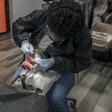
The California Dental Association (CDA) is recommending a number of ways the state can improve access to oral healthcare services for underserved populations, including new study of workforce models, appointing a state dental director, increasing fluoridation, and expanding the use of federally funded clinics.
The CDA also advocates re-establishing adult dental benefits in Medi-Cal, noting that some 8 million Californians will be older than age 65 by 2030.
During a session at the recent CDA fall conference in San Francisco, dental practitioners were encouraged to take a more active role to help shape national and local oral healthcare policies.
"The future of dentistry should be shaped by those who practice it," said CDA Vice President Lindsey Robinson, DDS, during a presentation outlining the CDA's recommendations. "Proposals coming from outside the profession do not value the same things that dentists value."
As a critical first step, the CDA is emphasizing the importance of getting a state dental director who could help secure funding for programs that would increase access to care.
— Lindsey Robinson, DDS, CDA
vice president
The association would also like to see the state appoint a task force for "an immediate investigation" into various workforce models to determine the safety, quality, cost-effectiveness, and patient satisfaction of irreversible dental procedures performed by nontraditional providers.
That recommendation is based on CDA-commissioned research on midlevel providers conducted by the New York University College of Dentistry. That study will be published in January, according to the CDA.
Prior studies of midlevel providers were "inadequate to analyze the issue," said Dr. Robinson, a pediatric dentist from Grass Valley , CA.
"The researchers reported that, while there is ample evidence to conclude that nondentists with appropriate training are capable of providing safe and high-quality reversible services (such as sealants), there are no studies -- and I'll repeat that, no studies -- with a sufficient level of evidence to demonstrate the safety, quality, and patient satisfaction of irreversible procedures performed by nondentists," she said.
Existing studies are deficient because of their methodology or sample size, she added.
Future research should consider defined public health settings, multiple models of dentist supervision, various pathways of education and training, and different provider models, including dentists and nondentists, Dr. Robinson said.
Legislation has already been introduced in California with the intent of expanding the dental workforce, she noted. The state senate is considering a bill (SB 694) to investigate the dental care needs of Californians.
"We need to be able to deliver the solid, research-based facts to introduce our workforce proposals and to creditably react to those proposed by others," Dr. Robinson said.
Expanding the capacity of federally qualified health centers is also needed, according to the CDA. Dentists could be paid for a predetermined amount of time or a set number of patients, according to the proposal. Such an arrangement would allow dentists to provide care for the underserved without the paperwork burdens of Medi-Cal.
Among the CDA's other recommendations:
A campaign to fluoridate San Jose's drinking water, the largest nonfluoridated metropolitan area in the state.
Setting up loan repayment programs, especially for dentists and extended function dental assistants who provide clinical care in public health settings.
Offering incentives for Medicaid reimbursement to provide selected services for infants and preschool children.
Electronic collaboration among medical professionals working in community settings such as schools and long-term care facilities .
Re-establishing adult dental benefits in the Medi-Cal program. Adult coverage will likely be a mandatory benefit within five to 10 years, the CDA predicted, especially for the elderly in nursing homes who have chronic medical conditions.
Requiring one year of postgraduate work for newly minted dentists, similar to New York, which has had such a requirement for several years. It would give young dentists the opportunity to work in nontraditional settings such as clinics, where they could provide care for underserved populations, according to the CDA.
The recommendations will be voted on by the CDA's House of Delegates in November.



















